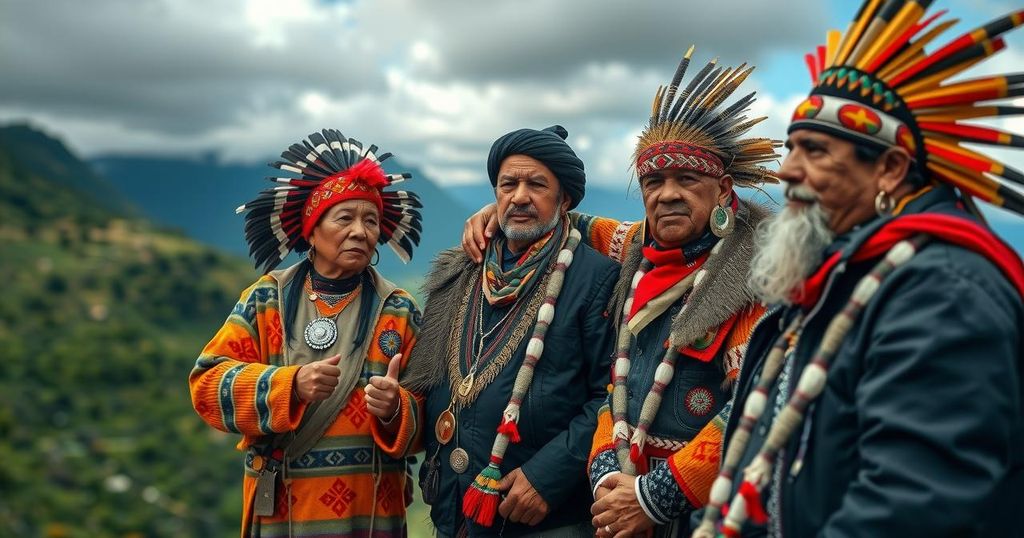Technology
AFRICA, AMAZON, AP, ASIA, CLIMATE CRISIS, EXCHANGE RATE, HOUSE OF COMMONS, JESUS JAVIER THOMAS GONZALEZ, KIN CHEUNG, LEADERSHIP, MEXICO, NORTH AMERICA, PAMUK TEÓFILO KUKUSH PATI, PAMUK TEOFILO KUKUSH PATI, PERU, PHILIPPINES, SANTANDER, SOCIAL ISSUES, SOUTH AMERICA, TS, UNITED STATES, WAMPIS NATION, WESTMINSTER HALL
Marcus Li
0 Comments
Indigenous Leaders from Peru Urge U.K. to Address Oil Damage and Bank Complicity
Indigenous leaders from the Wampis Nation in Peru traveled to the U.K. to advocate for a ban on international banks funding oil extraction in the Amazon, highlighting environmental damage caused by Petroperu’s operations and the need for corporate accountability regarding Indigenous rights.
Indigenous leaders from the Wampis Nation in Peru visited the United Kingdom to raise awareness about the detrimental effects of oil extraction on their ancestral lands. During their visit, leaders such as Pamuk Teófilo Kukush Pati and Tsanim Evaristo Wajai Asamat met with British lawmakers in the House of Commons, calling for a ban on the financial support provided by international banks to oil activities in the Amazon. The leaders highlighted the significant environmental destruction caused by oil spills from the state-owned Petroperu, which has faced numerous leaks along its pipeline. The financial involvement of banks such as HSBC, JPMorgan Chase, and Santander further exacerbates their plight, as these institutions backed a $1 billion bond offering intended for refinery upgrades.
The ongoing contamination of their fishing waters poses an immediate threat to the Wampis communities, endangering their way of life and biodiversity in their territory. The leaders assert that the banks are complicit in the degradation of their lands while expressing their determination to protect their environment. Despite Petroperu’s claims of compliance with regulations, the evidence suggests that oil extraction activities have led to significant environmental harm and community unrest.
Indigenous representatives also addressed issues related to illegal logging and mining in their territory and urged the U.K. government to establish stringent laws to hold corporations accountable for harming the environment and violating human rights. Their advocacy is part of a broader movement involving delegations from Colombia, Liberia, and Mexico, emphasizing the importance of corporate responsibility in resource extraction industries.
The leaders concluded their meetings by seeking measures that reflect the gravity of their situation and the urgent need for global awareness and action to protect indigenous rights and the Amazon rainforest.
This article focuses on the recent visit of Indigenous leaders from the Wampis Nation in Peru to the United Kingdom, where they sought to bring attention to the ecological damage caused by oil extraction and the complicity of international banks in these activities. The Wampis peoples have a long history of safeguarding their lands, but the expansion of oil industry operations has jeopardized their health, livelihood, and environment. The financial ramifications of international investment and its impact on Indigenous rights are at the forefront of their advocacy, presenting a critical intersection of environmental concern and human rights awareness within the global discourse.
In conclusion, the visit of the Wampis leaders to the U.K. underscores the urgent need for enhanced environmental protections and corporate accountability in resource-extracting industries. Their powerful testimonies regarding the adverse impacts of oil extraction serve not only to highlight their fragile situation but also to galvanize international support for Indigenous rights and environmental preservation. As they continue to advocate for their ancestral lands, the collective efforts of Indigenous groups worldwide remain vital in shaping policies that respect the rights of indigenous populations and protect the planet’s remaining rainforests.
Original Source: apnews.com




Post Comment